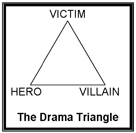You are a victim
Ken Pense of Rapid Shift Coaching told me awhile back that everyone views themselves as a Hero, Victim, or Villain. What about you?
To be an effective leadership role model and communicator you must understand when you and others fall into the drama or conflict triangle. Workplace drama occurs because people allow themselves to get stuck in a self-focus, rather than a we-focus. They choose, consciously or subconsciously, to view others as adversaries rather than partners.
The Hero, Victim, and Villain personas are roles we play in conflict, and we may move from one role to another as the workplace drama unfolds.

Hero
Do you consider yourself a hero? Are you constantly "riding into conflict" to do what is right, save the fair maiden, and see justice done... only to have one horse after another killed out from under you?
Heroes seek to protect, defend, and sometimes even the score. You may have courage and take action with selflessness and nobility. At times the hero ventures forth to do what must be done and achieving "justice" is the only goal. Without true heroes who step forward and risk taking a stand, despite their discomfort or fear, the world would be an evil empire.
Unfortunately though, too often a hero's sincere righteousness becomes self-righteousness, or self-centered. Maybe their "cause" was not so just in the first place, or got distorted as power is gained by conquest...
ASK YOURSELF: Do I think others are not as good as me and they are slowing my progress? Am I on a mission to win at all costs?
Victim
True victims of persecution are not the focus of this column. My concern is leaders who act like a victim, or working with people who suffer from a victim mentality.
Wikipedia: Victim mentality is an acquired (learned) personality trait in which a person tends to regard him or herself as a victim of the negative actions of others, and to think, speak and act as if that were the case - even in the absence of clear evidence. It depends on habitual thought processes and attribution.
Most of us have had conflict with this type of person in our workplace. Again, their standards for others are higher than for themselves. Others are against them and life is not fair. It is interesting that a victim mentality is LEARNED...
Consider some people in certain professions who take advantage of this:
Lawyers: You are the victim. Spend money with me and I will help you get what you deserve.
Therapists: You poor victim. I will confirm your problems are someone else's fault so you do not have to take responsibility for your failures. It they just hadn't ____ you would have a great life.
Employees: I work really hard, but never get the credit I deserve. Those other employees (or our company policies) are the problem...
Leaders: My employees are the problem... (However you hired them, manage them - kind of, develop them - rarely, and retain them even when they truly do not perform. So who is the victim?)
ASK YOURSELF: Am I blaming others rather than focusing on the one person under my control (me)? Am I taking full responsibility for my mistakes, job duties, and results?
Villain
Obviously villains are the bad person. They can be mean, controlling, manipulative... However, few people consider themselves the villain. Typically this role is cast on another even though there is a fine line between being a hero and a villain.
Why? Because the villain has their own story, often rooted in being a victim. Their focus is on revenge and they have their own self righteousness. Although terrorists exhibit this behavior, just consider a recent time when someone offended you.
ASK YOURSELF: Am I trying to work together with others, or get even with something that has occurred in my life? Is my desire to achieve motivating me to cross the line of integrity I have defined for others?
How to avoid conflict and manage people to work more effectively is a key focus of our Certified LEADER program. Sign-up today for our next 6 month session starting the week of October 5. Don't miss this chance to learn the proven systems and habits of great leaders.
The bottom line is we need to avoid the conflict triangle and work together. As leaders, we must be role models and not let our triggers to anger lead us astray.
For more information you can search "Hero Victim Villain" on the web. My favorite article is by Gary Harper on his Joy of Conflict site. As leaders we have to intentionally help people work together and avoid the conflict / drama triangle. This work starts with ourselves.
